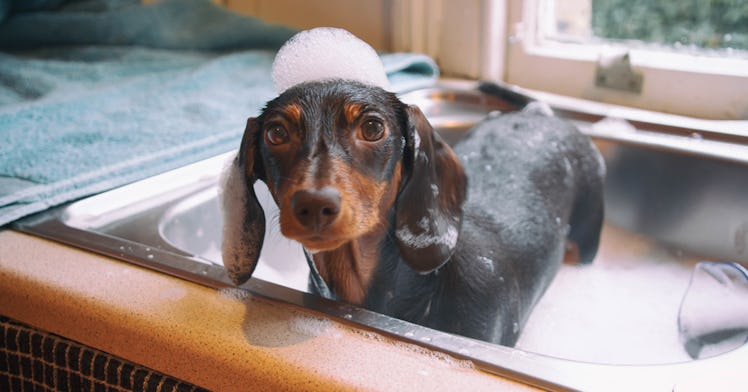The Benefits of Having a Dog Are Even Greater During Coronavirus Pandemic
Fido is more than a friend. He's also a fur-covered-stress-buster.

While all of us are dealing with various bouts of fear, anxiety, frustration, and boredom while hunkering down at home during the coronavirus pandemic, there’s a certain group among us that are having a great time: dogs. Millions of man’s best friends are living their best lives right now, excited by the fact that their humans are no longer rushing out of the door every day and instead remaining home with them for more walks, more belly rubs, more treats, more company. One 7-year-old dachshund named Rolo from the United Kingdom recently became a Twitter celebrity because he excitedly wagged his tail at the fact that his owners were staying home that he sprained his tail.
The simple fact is this. Dogs have no clue about what’s going on in the world. They’re not worried about the stock market or sickness or mass layoffs. In fact, all they see is a family who is home way more often than it used to be. This makes them an even more powerful ally than they already are.
“[Dogs are] not facing the same news articles in their face every day, and the same challenges with employment that many of the rest of us are facing,” says Maggie O’Haire, a professor at the Center for the Human Animal Bond at Purdue University. “They provide that sort of calm, stability, and normalcy.”
That they do. And luckily, all of that extra activity, and all those extra snuggles, are good for pet owners. Dogs have myriad benefits for their owners. Right now, those benefits need to be reaped. Hell, just petting a dog triggers dopamine, oxytocin and serotonin in human beings, which reduce our stress levels and help us calm the hell down when Zoom is being buggy or when we’re yelling at the screen during a press conference.
O’Haire’s research, which largely focuses on emotional support animals for veterans, those with PTSD or anxiety disorders, and children with autism, has found specifically that service animal ownership is associated with significantly lessened levels of cortisol and other hormones related to stress and anxiety. She also found that family members of those who owned service animals also had significantly lowered levels of depression, anxiety, and stress. Everyone wins!
Of course, the benefits of pet ownership on the owner’s mental health doesn’t just stop at service animals for veterans who have been diagnosed with PTSD. O’Haire points to the breadth of research that shows that people who own pets are happier and healthier than those who do not.
One study from the Anxiety and Depression Association of America (ADAA) found that pets provide a sense of security and routine to people managing long-term mental health problems. Other research from the Human Animal Bond Research Institute found that pet owners saved 11.7 billion in health care costs due to their increased physical health and that 80 percent of pet owners they surveyed felt their pet makes them feel less lonely. The same research found that pet ownership is associated with an improved quality of life through social support and reduced depression, and that pet owners report higher life satisfaction than non-owners. Other research has shown that your heart rate variability — also known as the ability of the heart to duck, dive, and respond to stress — improves with pet ownership.
The CDC notes that health benefits of owning a pet include decreased blood pressure, cholesterol levels, triglyceride levels, and feelings of loneliness. All of these benefits are important but even more so in these DEFCON-1 times we’re facing. It doesn’t hurt that dog ownership is leads to increased exercise and outdoor activities — walks are still allowed in quarantine and social distancing — and increased opportunities for socialization between human and pet, as pets can, per O’Haire, be as important as other human beings for decreasing feelings of loneliness and helping people feel supported in trying times.
“The level of support between pets and their owners is actually at levels similar to what we see from support from significant others, family, or friends,” O’Haire says, pointing to the emotional importance of dogs. So, even people who live alone with their pet are more likely to cope a bit better with the daily stresses of a pandemic than those who do not.
For the time being, all the average working American can do is keep their distance from others, socially isolate, and do their best. And, if they’re lucky enough to own one of the 89 million dogs in America, they can go play tug of war or snuggle with Fido. In these times, this type of companionship is important. Dogs can remind us that there are others who still need us, despite our stresses, despite our worries.
“Pet owners can take advantage of this time by cherishing the positive sides of pet ownership,” O’Haire says. “Take your dog for a walk. Spend some mindful moments laughing at the silly things your dog is doing. It’s a time for both sides — the human and the dog — to have extra time together and enjoy the good parts. Feel that support and joy that everyone needs right now.”
And isn’t nice to have a friend who’s just psyched that we’re all home?
This article was originally published on